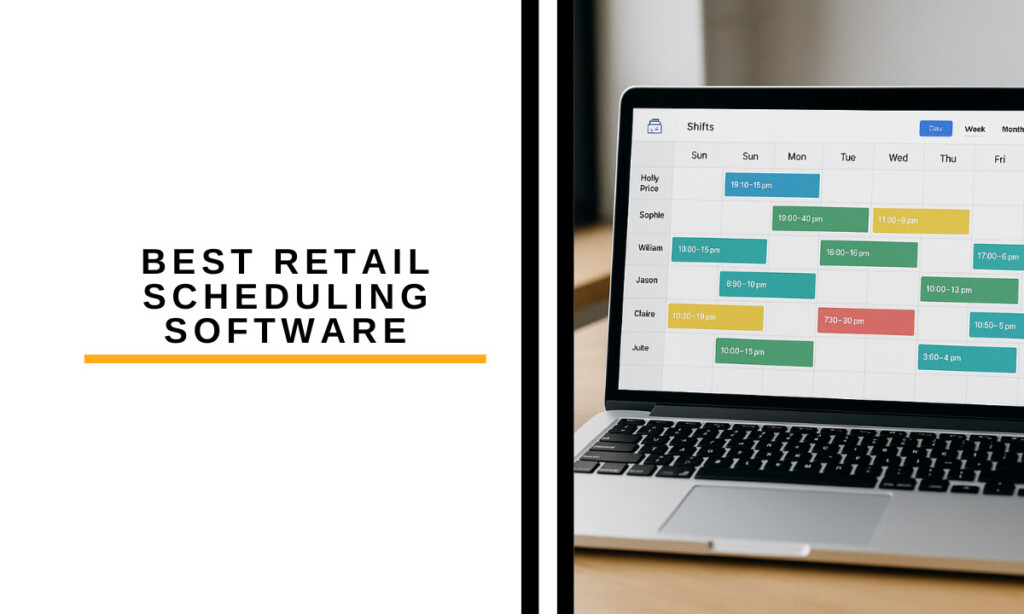Last Updated on December 30, 2025 by Ewen Finser
If you’ve ever managed a retail schedule, you know it’s basically like playing Tetris, but the pieces keep changing shape at the last second. Someone calls in sick, another begs for a shift swap, and you’re left juggling sticky notes, Excel spreadsheets, and a prayer.
That’s where retail scheduling software steps in.
The right platform can take your shift chaos and turn it into something almost… pleasant. (Okay, maybe not pleasant, but at least manageable.) I’ve tested some of the top options out there, and here are the best retail scheduling software picks for 2025.

Spoiler: Homebase tops my list for small to mid-sized retailers because it’s simple, affordable, and packed with useful features. But depending on your team size, budget, and industry quirks, there are plenty of other strong contenders.
A Quick Look at the Best Retail Scheduling Software
Here’s the cheat sheet version before we get into the nitty gritty:
Product | Best For | Key Features | Pricing |
Homebase | Small retailers who need an all-in-one tool | Scheduling, time clocks, payroll, and a free plan | Free or starting at $30/mo |
When I Work | Mobile-first scheduling and communication | Shift swaps, chat, and labor cost control | From $2.50–$5 /user/mo |
Deputy | Multi-location businesses scaling quickly | Compliance, forecasting, and integrations | From $4.50–$6/user/mo |
Shiftboard | Large enterprises and complex labor needs | Demand-based scheduling, compliance, and reporting | Custom pricing |
ZoomShift | Hourly shift-based teams | Drag-and-drop scheduler and time tracking | $2–$4/user/mo |
Sling | Communication and scheduling in one | Messaging, PTO tracking, and shift alerts | Free or starting at $1.70–$3.40 /user/mo |
7shifts | Retail and food service hybrids | POS integrations and sales forecasting | From $39.99/mo–$134.99 |
Humanity | Advanced compliance needs | Rule-based scheduling, analytics, and a mobile app | From $2.75/user/mo to custom |
Connecteam | Deskless and frontline workers | Scheduling, task management, and training | Free or $29–$99 /mo |
Workforce | Complex labor operations and reporting | Compliance, forecasting, HR, and payroll integrations | Custom pricing |
What to Look for in Retail Scheduling Software
Choosing retail scheduling software isn’t just about picking the flashiest app. It’s about finding a tool that makes your day easier.
Here are the features that matter most when you’re running a store:
Ease of Use
If it takes hours to build one schedule, the tool is a waste. Look for drag-and-drop builders, reusable templates, and mobile apps that let you tweak things on the fly.
Communication Tools
Shift swaps, time-off requests, and last-minute updates should happen inside the app, not through group texts at midnight. Built-in chat or announcements save you (and your sanity).
Compliance and Labor Laws
Depending on where you operate, labor laws can get tricky. Good software flags potential violations, like scheduling someone under 18 for a late shift or pushing staff into overtime.
Integrations
The best platforms connect to your POS and payroll systems. That means no double entry, fewer mistakes, and better insights into labor costs vs. sales.
Flexibility and Scalability
Whether you’re managing one store or ten, you need software that grows with you. A strong free plan is great for testing, but make sure upgrades offer value as your team expands.
Best Retail Scheduling Software
So what actually makes scheduling software “the best” for retail? For me, it came down to:
- Ease of use: Does it save time or just add another headache?
- Pricing: Fair for small businesses, scalable for larger ones.
- Communication: Shift swaps, updates, chat.
- Integrations: POS, payroll, and HR tools.
- Mobile-friendliness: Because no one logs in from a desktop to check shifts anymore.
Here’s the breakdown of the tools I tested:
1. Homebase
Best for small retailers who need an all-in-one solution

Homebase has a reputation for being small-business friendly, and for good reason. It bundles together everything a retail manager actually needs: scheduling, time tracking, team messaging, payroll, and even HR compliance. You can build schedules in minutes and push them to employees’ phones instantly.
When I tested Homebase, the biggest win was how easy it was to manage last-minute changes. Someone could request time off, another could pick up the shift, and the system updated instantly without me needing a dozen text messages. It genuinely felt like going from chaos to calm.
What really impressed me was how seamlessly payroll connects with scheduling and time tracking. Once hours are approved, payroll takes care of itself—no exporting spreadsheets, no retyping data. It even handles overtime, breaks, and tips automatically, while flagging potential compliance issues before they cause problems. Setup is quick, and once you’ve got it running, payday feels almost effortless.
A quick comparison of the different Homebase options shows you exactly what you’re paying for:
- Basic: free
- Essentials: $30/month
- Plus: $70/month
- All-in-One: $120/month
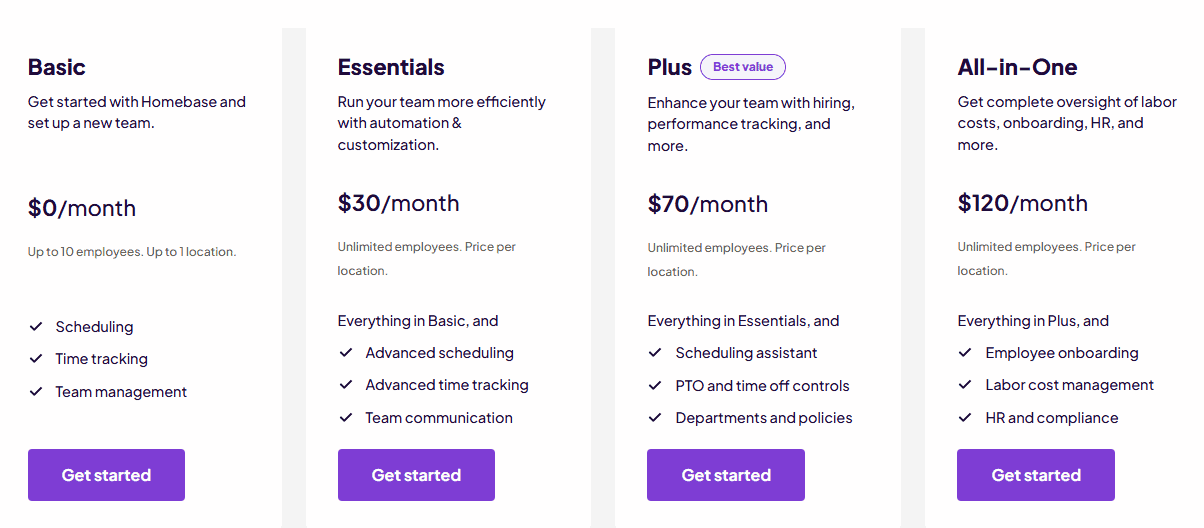
Key features:
- Free plan with scheduling, time clocks, and hiring tools
- Payroll add-on to run everything from one place
- Team communication built right in
- Mobile app that staff actually like using
Read our Full Homebase review here: Homebase Review: Who Should Use It
2. When I Work
Best for mobile-first teams

When I Work is sleek, mobile-focused and built for teams that live on their phones (so, basically every retail team). Employees can swap shifts, pick up open ones, and chat with each other directly in the app. Managers get visibility into labor costs and overtime before they spiral.
I found the mobile interface particularly smooth. It was like handing my team a group chat and scheduling assistant in one.
The pricing structure shows exactly what you’re paying for:
- Single location or schedule: $2.50/user/month
- Multiple locations or schedules: $5.00/user/month

Key features:
- Shift swaps and open shift claiming
- In-app team messaging
- Overtime alerts and labor cost insights
3. Deputy
Best for scaling multi-location retailers
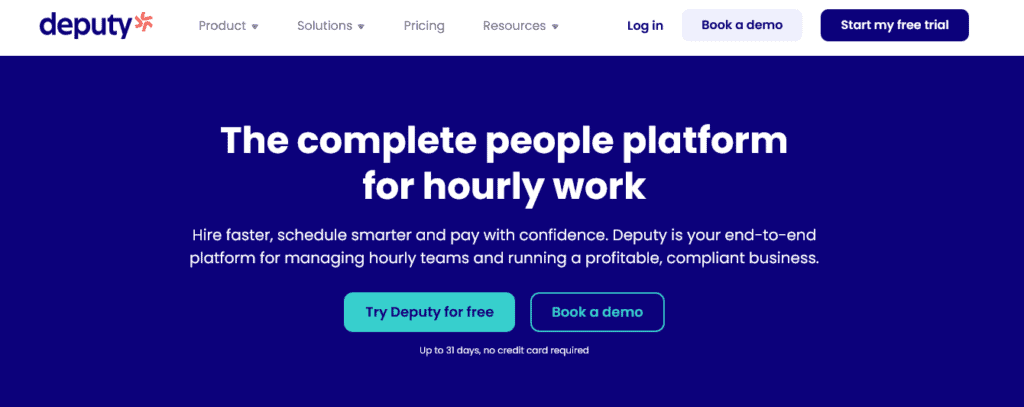
Deputy shines when your business isn’t just one shop anymore. It’s built for compliance, forecasting, and integration with your payroll and POS systems. If you’re running multiple locations, the software makes sure you don’t accidentally schedule someone across town when they’re supposed to be elsewhere.
The compliance features were impressive, and I got alerts if schedules didn’t align with labor laws, which can be a lifesaver if you’re expanding fast.
Deputy has several pricing plans, each with unique benefits, so choose the option that works for your retail team.
- Scheduling: $4.50/month
- Time & Attendance: $4.50/month
- Premium: $6/month
- Enterprise: custom pricing
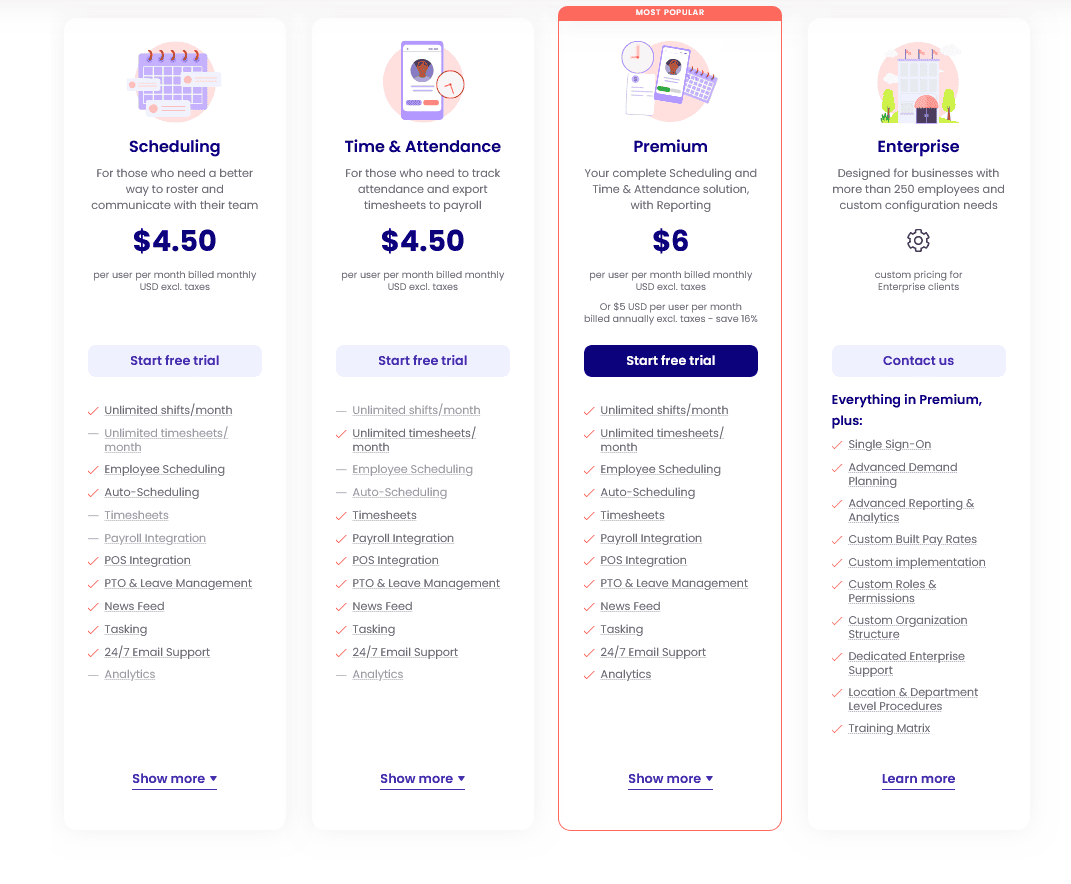
Key features:
- Labor compliance alerts
- Demand forecasting based on sales
- Integrates with POS and payroll systems
4. Shiftboard
Best for enterprise workforce scheduling

Shiftboard is the heavyweight here. It’s designed for large, complex operations where schedules change based on demand (like distribution centers or massive retail chains). Expect demand-driven scheduling, compliance reporting, and customization galore.
It’s not the most beginner-friendly, but once you get rolling, it’s powerful. The reporting alone made it clear this is for enterprises, not mom-and-pop shops. This overview of Shiftboard shows some of the features of their subscription plans, and you need to contact the company for pricing:
Key features:
- Demand-based, automated scheduling
- Advanced compliance and reporting tools
- Highly customizable workflows
5. ZoomShift
Best for hourly, shift-based retailers

ZoomShift is simple but effective for hourly workers. It uses a drag-and-drop interface that makes scheduling feel more like moving puzzle pieces than crunching spreadsheets. Time tracking and timesheets are included, which keeps payroll accurate.
I liked how fast it was to rearrange schedules without redoing the whole thing. It’s perfect for managers who just need something straightforward. Choose from the free, starter or premium plans with ZoomShift:
- Essentials: free
- Starter: $2/active member/month
- Premium: $4/active member/month
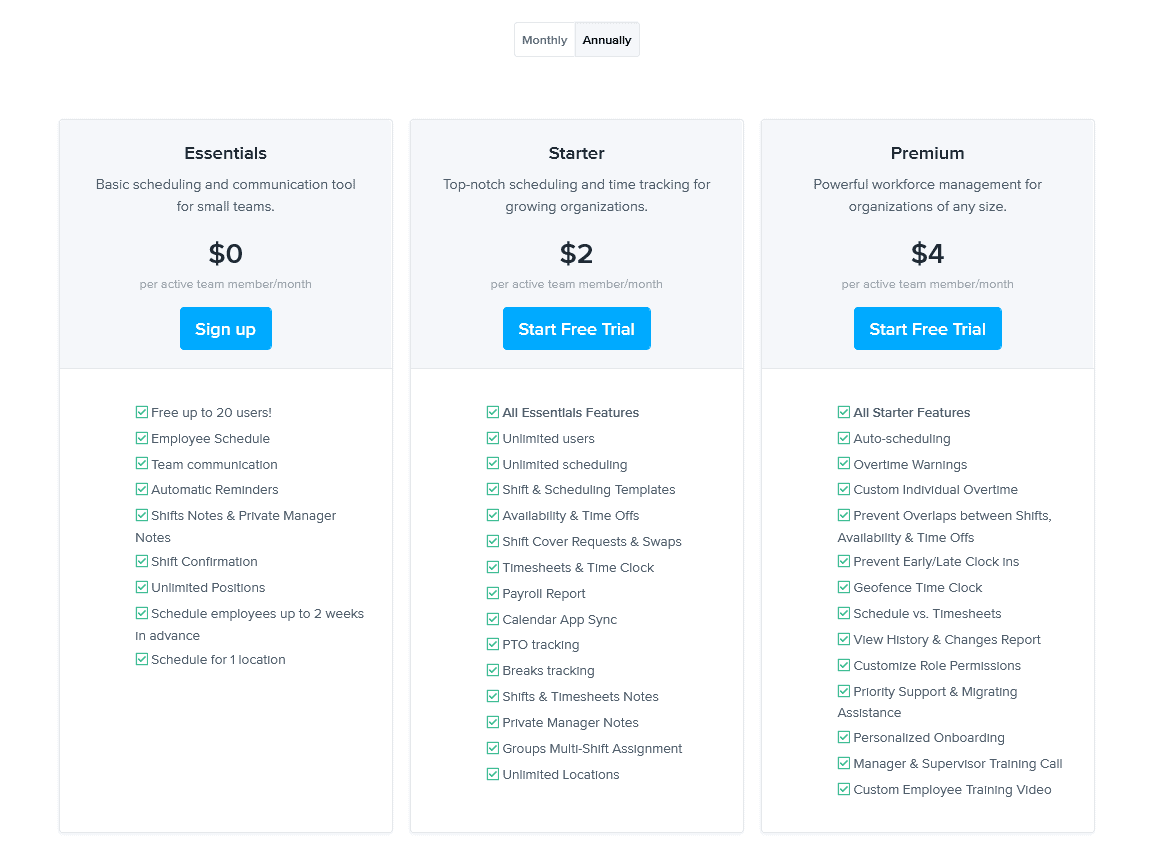
Key features:
- Drag-and-drop scheduling
- Time tracking and timesheets
- Easy payroll exports
6. Sling
Best for team communication alongside scheduling
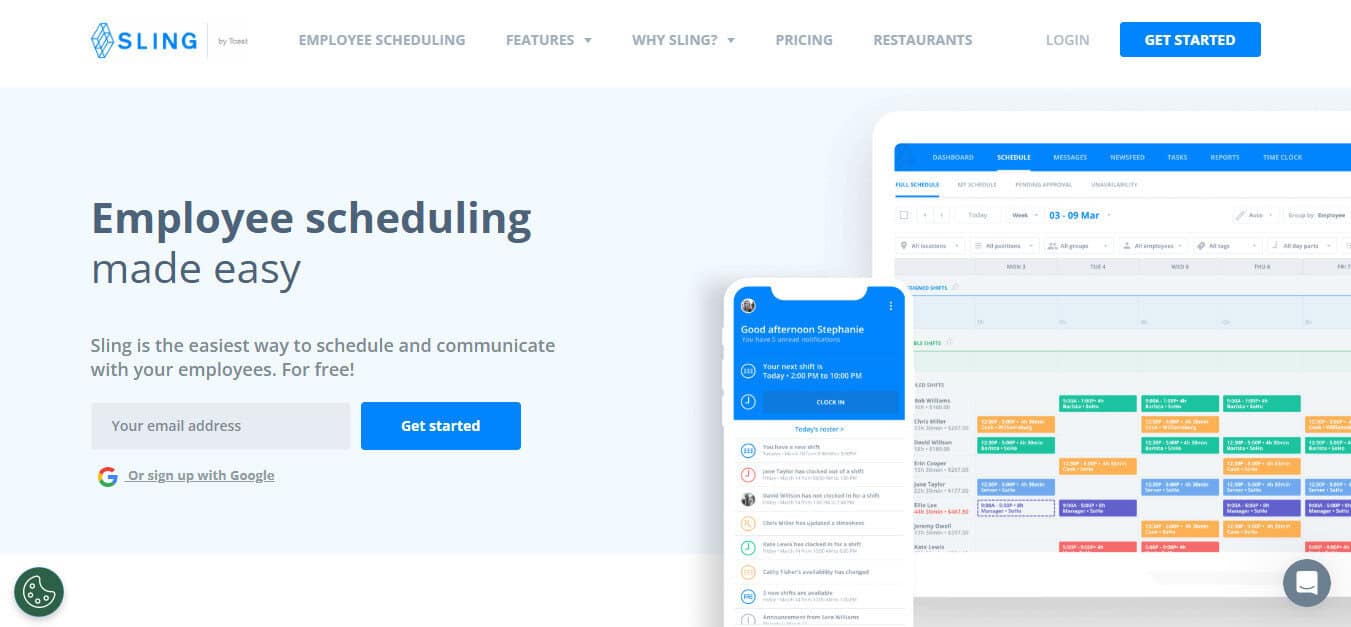
Sling combines scheduling with built-in messaging, task management, and PTO requests. It’s part schedule builder, part Slack-lite, which works well if you want fewer apps floating around your team.
The messaging was a standout for me, with fewer group texts, fewer missed updates. Choose from the free, premium and business options to meet your needs.
- Free for up to 30 users
- Premium: $1.70/user/month
- Business: $3.40/user/month

Key features:
- Free plan for basic scheduling
- PTO and availability management
- In-app messaging and announcements
7. 7shifts
Best for food + retail hybrid environments
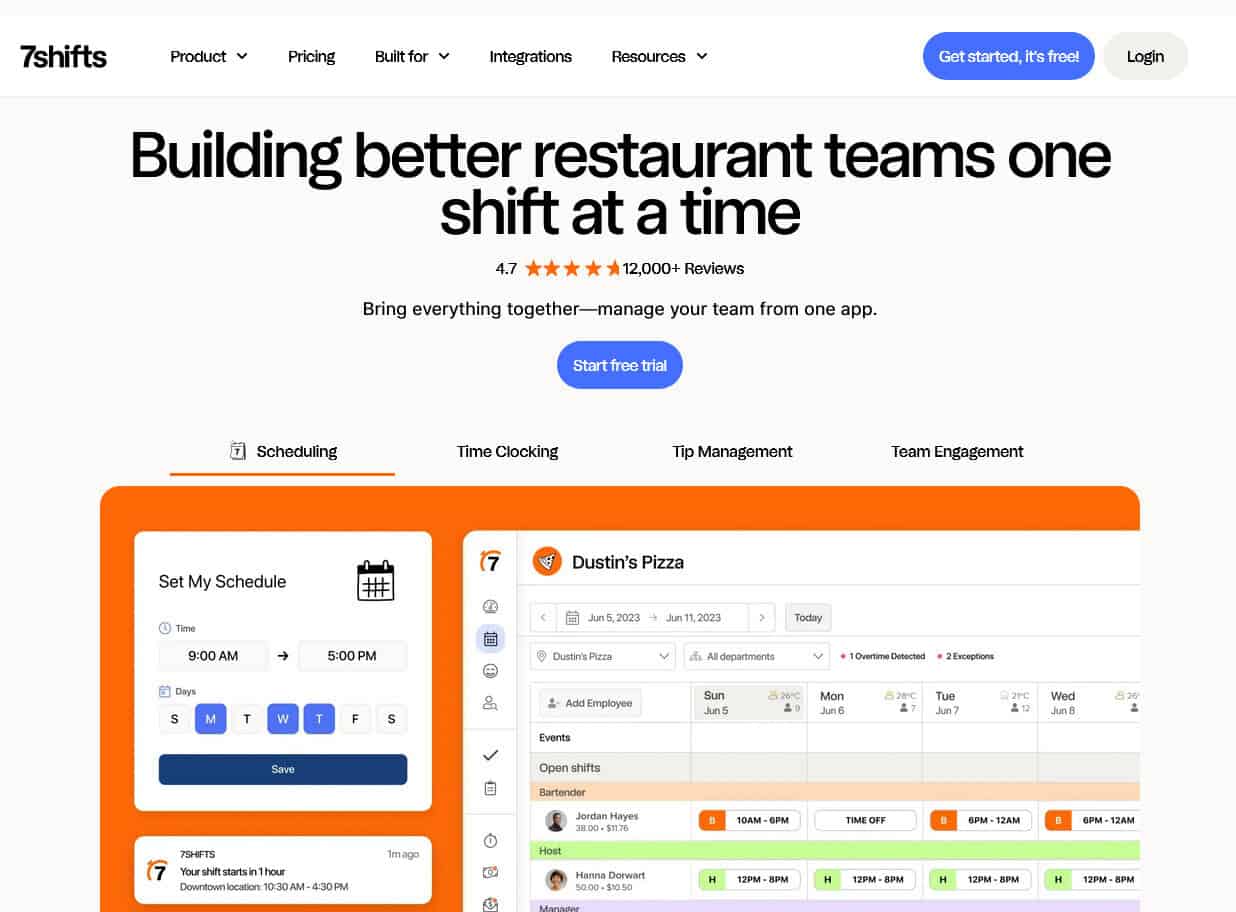
Although originally designed for restaurants, 7shifts also works well for retail teams that have similar scheduling headaches (variable demand, turnover, hourly shifts). It syncs with POS systems, so you can forecast schedules based on sales.
When I tried it, I noticed the analytics were particularly strong, especially around sales vs. labor hours. The Pro version offers excellent value for an industry where your staffing may change monthly or even weekly, and for a single flat rate, it offers a host of capabilities.
- Comp: free for up to 15 employees
- Essentials: $39.99/month
- Pro: $79.99/month
- Premium: $134.99/month
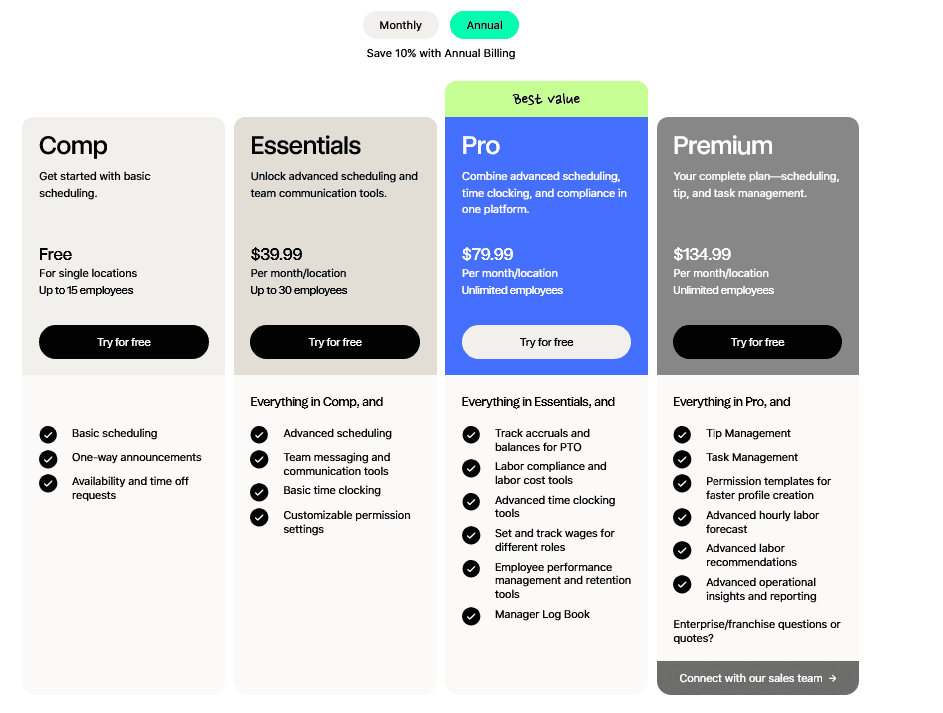
Key features:
- POS integrations for smarter scheduling
- Sales forecasting and labor reports
- Task lists and communication tools
Also read: Homebase vs 7shifts
8. Humanity by TCP
Best for advanced compliance needs

Humanity is built for compliance-heavy industries and larger retail chains. It offers rule-based scheduling and powerful analytics.
It takes a little setup, but the guardrails are worth it if you’re in a highly regulated state. Choose from three paid plan options to suit your staff scheduling needs.
- Essentials: $2.75/employee/month
- Professional: $3.75/employee/month
- Enterprise: custom pricing

Key features:
- Rule-based, automated scheduling
- Advanced reporting and analytics
- Mobile-friendly scheduling
9. Connecteam
Best for deskless and frontline workers
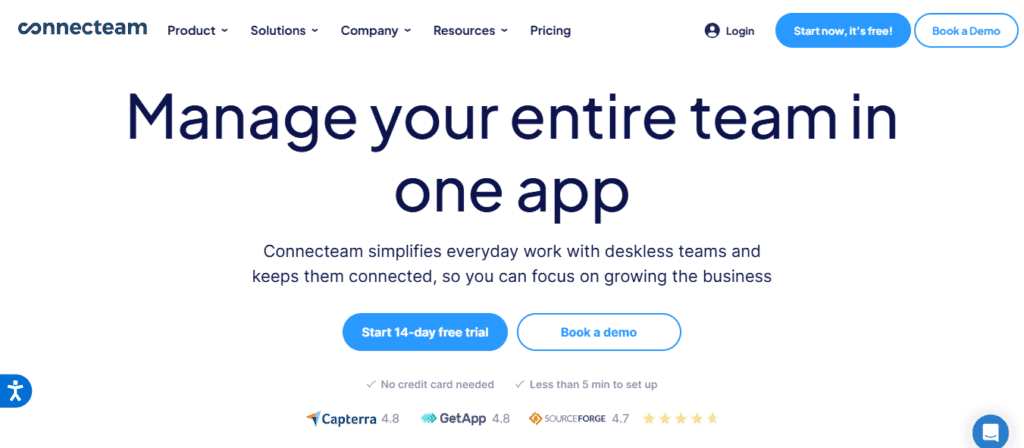
Connecteam is more than scheduling. It’s almost a mini-OS for managing deskless teams. You can build schedules, assign tasks, send training modules, and track progress all in one app.
It felt more robust than most on this list, almost like a project manager plus a scheduler. Choose from detailed options on the subscription menu and find an option that works for your staffing and scheduling needs.
- Basic: $29/month
- Advanced: $49/month
- Expert: $99/month
- Enterprise: custom pricing
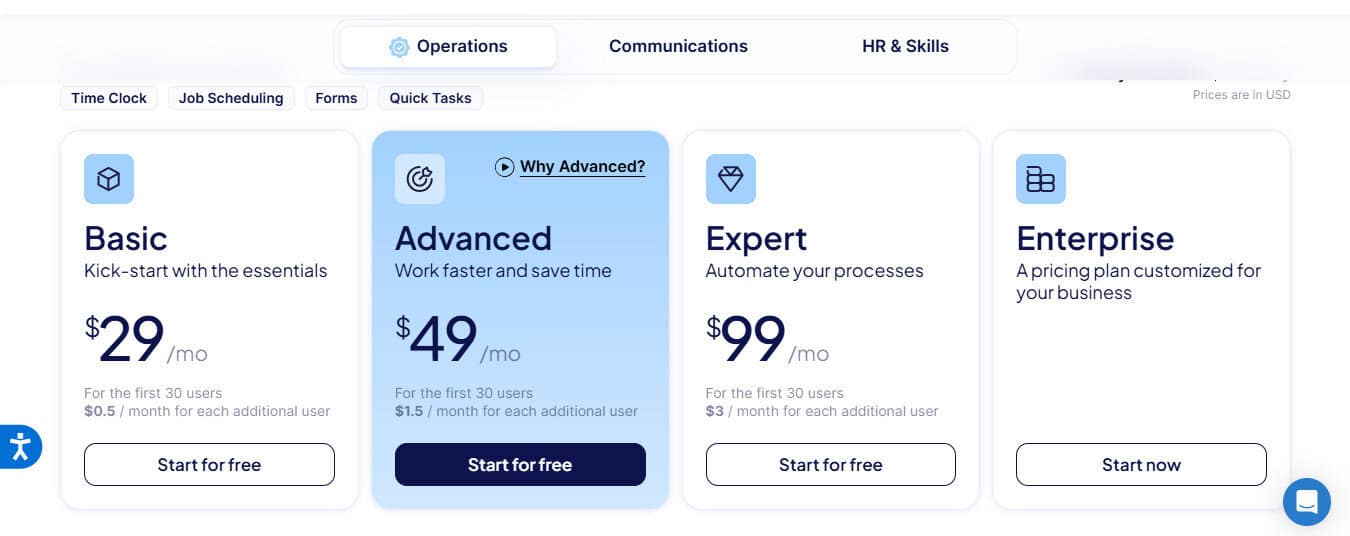
Key features:
- Scheduling and task management
- Training and onboarding tools
- Team communication built in
10. Workforce.com
Best for complex labor operations
Workforce.com is built for big operations with complex scheduling and reporting needs. Think compliance, labor forecasting, and integration with broader HR and payroll systems.
The reporting dashboards were particularly detailed, making it clear this is a tool for companies that need data-driven decisions. With a ROI of 455%, the paid plans are worth investing. Contact the team for a quote.
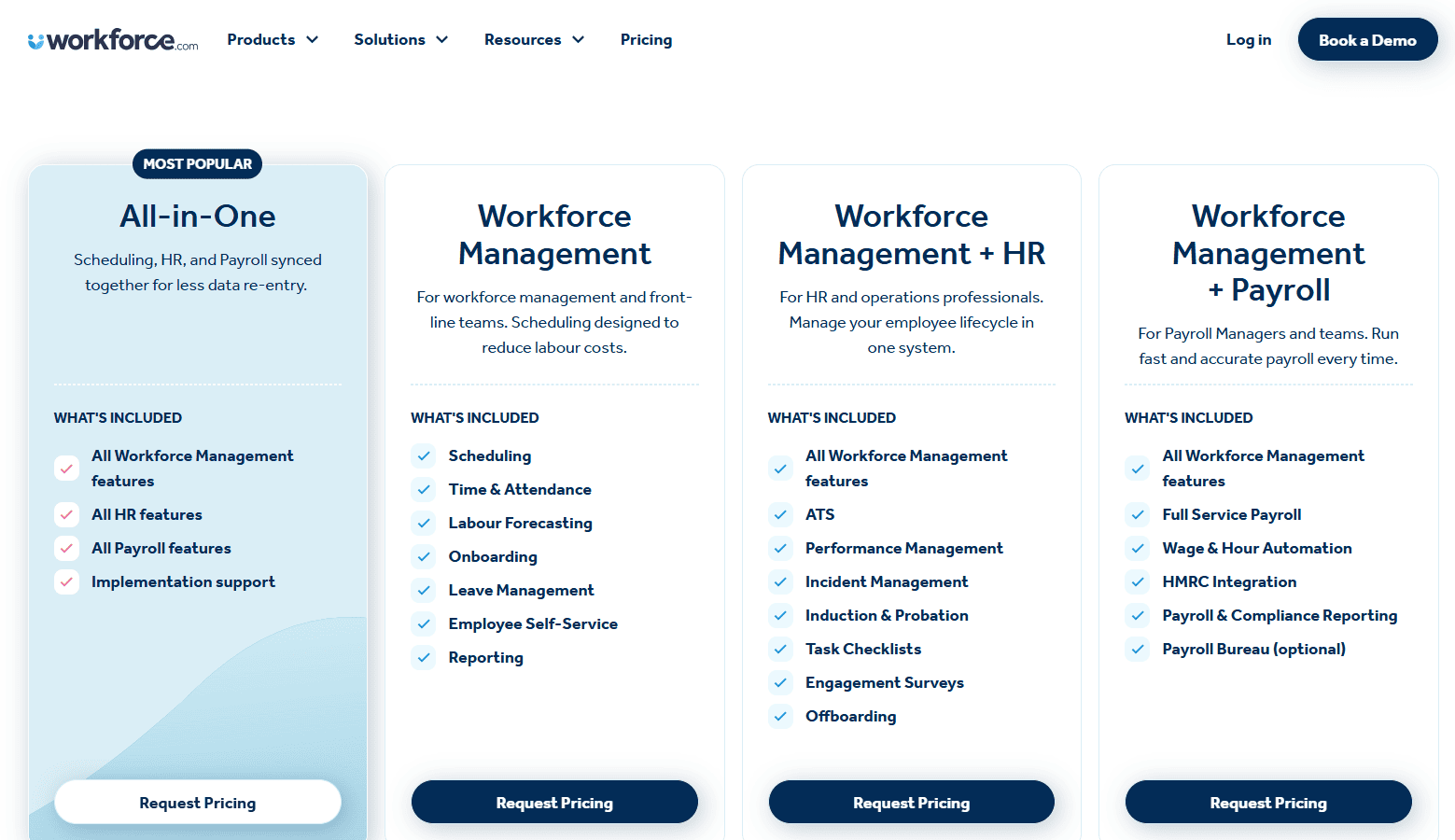
Key features:
- Compliance and demand-based scheduling
- HR, payroll, and POS integrations
- In-depth analytics and dashboards
FAQs
Question: What is retail scheduling software?
Answer: It’s a tool that automates building, sharing, and adjusting employee schedules, often with time tracking, payroll, and compliance features.
Question: How much does retail scheduling software cost?
Answer: Free to $30/user/month, depending on features. Many offer free plans or trials.
Question: Do I need retail scheduling software if I only have one store?
Answer: Yes, if you have more than a handful of employees. It cuts down miscommunication and errors.
Question: What features should I look for in retail scheduling software?
Answer: Ease of scheduling, mobile app access, shift swapping, compliance tools, and payroll/POS integrations.
Question: Can retail scheduling software help reduce employee turnover?
Answer: Yes. Clear communication and fair scheduling reduce burnout and keep staff happier.
Homebase: The Best Retail Scheduling Software
Retail scheduling doesn’t have to feel like herding cats. The right software can give you back hours of your week, keep employees happier, and even save you money on labor costs.
For small to mid-sized retailers, Homebase is hard to beat with its all-in-one platform and free plan. But depending on your team size and complexity, tools like Deputy, When I Work, or Shiftboard might be a good fit, too.
Bottom line? Test a free plan or demo, and you’ll quickly see which tool matches your store’s style.
Related read:

